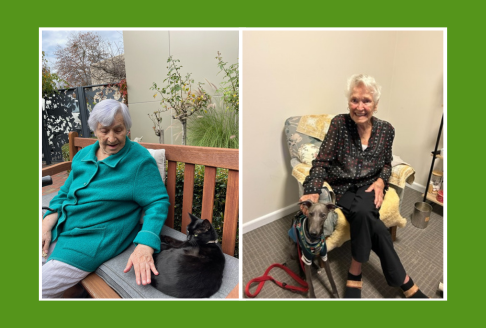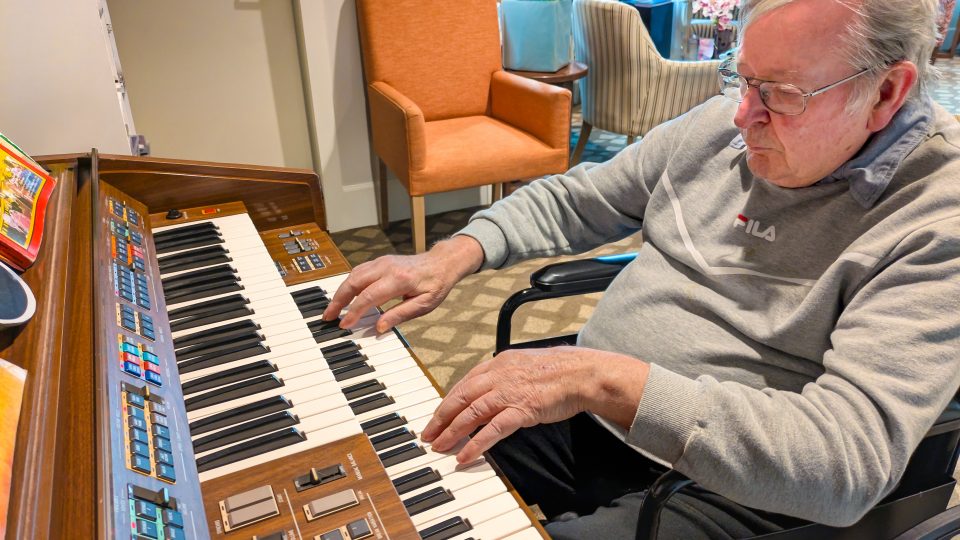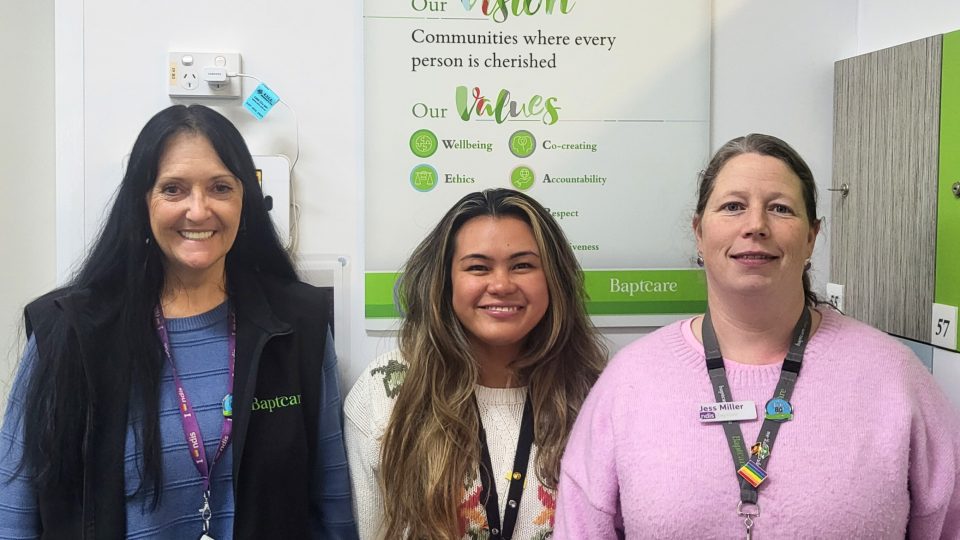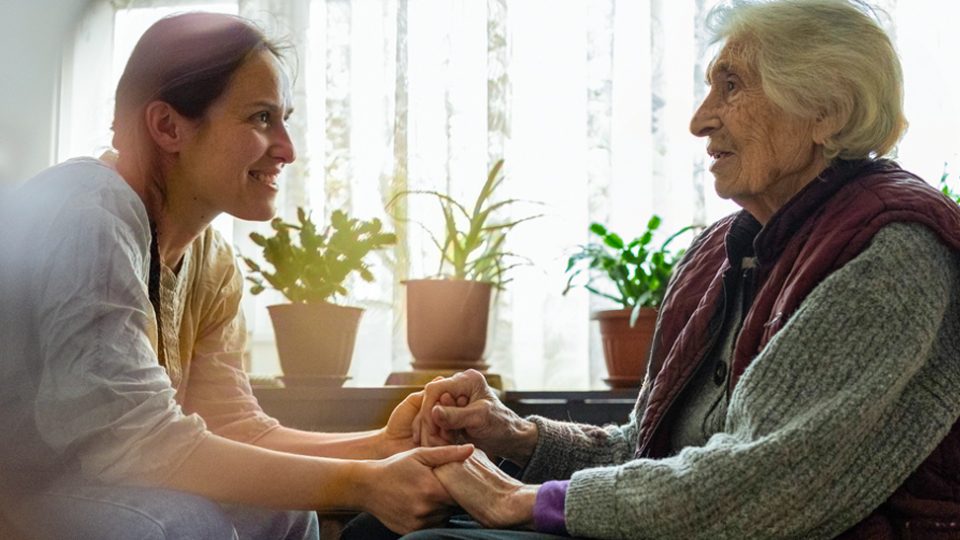The benefits of pet therapy in aged care settings
- 17 Jul 2023

Those of us with a love for pets know all too well the joy they bring into our lives. Benefits include improved physical, emotional and social well-being as we connect and bond with our pets, take care of their needs and receive their unconditional love in return.
People moving into an aged care community may not always have the ability to look after their own pet on site. They can, however, still look forward to interacting with pets through visiting programs or animal assisted therapy sessions.
At many of our aged communities, Baptcare is pleased to offer both formal therapy sessions and more informal pet visits. Our Karana community, in Kew, has a resident cat, Miss Mona, along with visits from Morris, the pet therapy dog and an assortment of dogs living with our residents’ families who pop in for a visit each Thursday.
Ann Marie Harli, Lifestyle Coordinator at Karana, has seen first-hand the benefits experienced by residents interacting with pets. “The feedback has been amazing,” says Ann Marie. “The comments from our residents about Miss Mona the cat shows how much joy and connection she brings to their lives.”
Here’s just a few of the many adoring comment on Miss Mona from our Karana community:
“I pat her and she is lovely, she’s so soft and doesn’t hurt anyone.”
“I like trying to read her mind when she is telling you something.”
“I really enjoy seeing the residents when she jumps on their trolleys and sits there for a ride.”
“I love the way she comes into activities to be part of the group.”
“Seeing a cat asleep on a chair feels like home.”
Says Ann Marie, “I have a great deal of faith in the pet therapy program here at Karana and would like to encourage others to consider this type of program, too.”
What is animal assisted therapy?
Animal assisted therapy, or pet therapy, is a guided treatment session designed to support individual health goals – physical, mental and social. Animal assisted therapy is not just limited to supporting people in aged care. It can have broader applications, including emotional and behavioural problems in children, addiction and autism to name just a few.
Research shows that animal assisted therapy can improve the physical and emotional health of older people living in aged care communities. Benefits for residents include:
- Reduced loneliness and isolation: through providing companionship and unconditional love.
- Reduced stress and anxiety: connecting with pets can be a calming experience, providing a distraction from negative thoughts and feelings.
- Increased physical activity: pet therapy can encourage people to get up and move around to better interact with their chosen animal.
- Improved cognitive function: being around animals can stimulate people’s minds about their experiences owning pets, assisting with memory recall.
- Enhanced social interaction: when pet therapy is done in a group context, it can help bring people together and encourage them to interact with one another.
Specific benefits for elderly people living with dementia
In addition to these general benefits which can be enjoyed by aged care residents, elderly people living with dementia can enjoy specific effects. These include:
- Reduced agitation and aggression: petting an animal can be quite soothing, allowing someone with dementia to feel comforted by the experience, reducing tension.
- Improved communication: animals can help stimulate memories and conversation – or even just smiling, laughing and eye contact for those who have lost the ability to speak.
- Enhanced memory and recall: interacting with animals can help trigger memories and associations for people experiencing memory loss.
- Increased motivation and engagement: regular pet therapy sessions can give people something to look forward to and help them stay involved in their surroundings.
Who benefits most from animal assisted therapy – and who might not
Animal assisted therapy is best targeted at those who enjoy positive memories with animals and pets. It is not suited to those with animal allergies or for those with immune issues unless strict infection control procedures are in place.
Pet therapy is a wonderful way to improve the quality of life for elderly people in aged care. When properly targeted, it can be a valuable tool to help make aged care residents feel more at home and relaxed.
Baptcare is delighted to provide our aged care residents with guided pet visits through our vibrant lifestyle programs. These programs are designed to create stimulating activities and experiences tailored to our residents’ needs, cultural backgrounds and abilities. To learn more about our residential aged care communities click here.
Community news
-

Wyndham Lodge Choir
Every Tuesday afternoon, residents gather in the sunny music room at Baptcare’s Wyndham Lodge Residential Aged Care community to sing together.
- 25 Jun 2025
-

The Green Team at Moonah Hub
The Sustainability Team, known as ‘The Green Team’, are based at Baptcare Moonah Hub in Hobart and are all about promoting environmentally friendly and sustainable practices in their office, the wider organisation and the local community. We asked Jess Miller, their enthusiastic and determined leader, all about the team and what they do. Read more below!
- 11 Jun 2025
-

Tips for addressing depression in older adults
Our post-retirement ‘golden years’ are often portrayed as a time of relaxation and enjoyment with plenty of time on our hands to enjoy the things we love. However, for many older adults this period can be overshadowed by struggles with depression.
- 05 Jun 2025
